Background
Before the outbreak of the American Revolution, British colonists protested new taxes by refusing to buy things that were shipped from England. Women were important to these boycotts, because they were in charge of all the purchases made for colonial homes and families. They also had the skills to make homemade substitutes for British products.
In New England, women joined in the boycotts by going to spinning bees. At these events, women would set up spinning wheels and keep each other company while they spun yarn that could be woven into fabric. The fabric made this way was called “homespun.” Wearing clothing made from homespun fabric was one way to demonstrate your support for the rights of the colonies in the 1760s and 1770s.
Most spinning bee participants were young, unmarried women, because they were the people who had the spare time for such work. Spinning was considered an acceptable way for women to express their political opinions, because it was within the bounds of traditional women’s work.
About the Artifacts
To make yarn or thread, fibers from wool, flax, or cotton must be tightly wound together to form a single strand. For most of human history, this “spinning” work was done by hand, but the process was slow. The spinning wheel, which was first invented in India between the years 500 and 1000, made the work much faster. The large wheel is powered by a foot pedal, and as the wheel spins, it causes a smaller spindle to whirl at a very fast speed. The person operating the wheel steadily feeds fibers onto a strand of yarn attached to the spindle, and they are wound tightly as the spindle spins.
In the British American colonies, spinning was traditionally women’s work. By the mid-1700s most women did not need to spin their own yarn, because they could buy fabric at stores. But when the colonists started boycotting British fabric because of the new taxes, it inspired a whole new generation of women to learn the skill of making their own fabric from their mothers and grandmothers.
Vocabulary
- boycott: When a group of people refuses to buy something to express their displeasure.
- flax: A plant whose fibers can be used to make thread or yarn.
- homespun: Homemade fabric.
- spindle: A round stick used to wind fibers into thread.
- spinning bee: A gathering where women keep each other company while they spin yarn. These became political events in the years before the American Revolution.
Discussion Questions
- What are the different pieces of this object? How do they work together?
- What would it be like to produce a shirt from scratch, starting with unspun wool?
- Why did spinning yarn become a political act in the British colonies?
- Why were spinning yarn and wearing homespun clothing acceptable forms of political protest for women?
Suggested Activities
- Combine this object with the loopwagen and the chatelaine and sampler for a larger lesson about women’s responsibilities in colonial homes.
- Teach this object together with any of the following for a lesson on the many ways women expressed their political opinions during the American Revolution, and how their actions were received: A Call to Arms, The Edenton Tea Party, Political Caricatures, Sentiments of an American Woman, and Abolition and Revolution.
- Teach this object along with any of the following for a lesson about the many ways women actively participated in both sides of the American Revolution: A Call to Arms, Sentiments of an American Woman, Life Story: Margaret Corbin, Life Story: Lorenda Holmes, Life Story: Margaret “Peggy” Shippen Arnold, and Life Story: Nanyehi Nancy Ward.
Themes
ACTIVISM AND SOCIAL CHANGE; WORK, LABOR, AND ECONOMY
New-York Historical Society Curriculum Library Connections
- For resources relating to the American Revolution in New York, see The Battle of Brooklyn.







